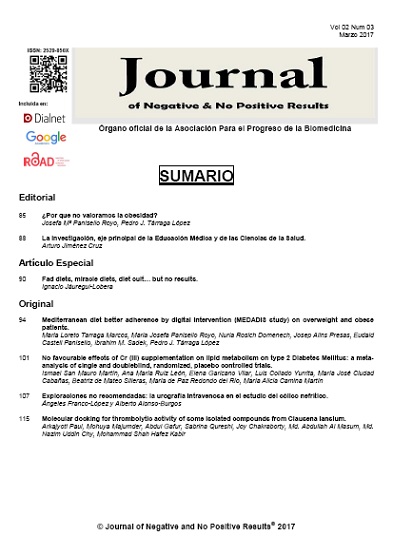Dietas de moda, dietas milagro, culto a las dietas... sin resultados.
DOI:
https://doi.org/10.19230/jonnpr.1301Palabras clave:
Dietas de moda, dietas milagro, culto a las dietas, pérdida de peso, comer sanoResumen
Las dietas de moda o dietas milagro (culto a las dietas) son dietas que hacen promesas de pérdida de peso o beneficios para la salud (por ejemplo, prolongar la vida) sin tener un sólido soporte científico y habitualmente se caracterizan por ser muy restrictivas o por elecciones dietéticas inusuales. Muchas veces estas dietas están promocionadas por celebridades y por algunos “profesionales” de la salud y suelen resultar atractivas para la gente que desea perder peso rápidamente. Mediante argumentos pseudocientíficos, los diseñadores de estas dietas milagrosas o mágicas habitualmente las describen como saludables y con extrañas propiedades pero siempre con indudables beneficios. Tras revisar la historia de estas dietas y explorar la evidencia científica, debe decirse que no hay una dieta mejor que comer menos, moverse más y comer gran cantidad de frutas y verduras. Además, es necesario ser consciente de nuestros hábitos diarios en general, recordando que comer es importante pero no lo es todo. Estar activo es también muy importante para mejorar (o recuperar) nuestra salud. En resumen, comer de modo saludable y cuidar de sí mismo son una obligación pero no un milagro.
Descargas
Citas
Bartoš H. Philosophy and dietetics in the Hippocratic on Regimen. A delicate balance of health. Stud Anc Med 2015;44:1-313.
Foxcroft L. The Origin of the Diet. London: Profile Books;2011.
Gruber B. The history of diets and dieting. [cited 2017 Jan 5]. Available from: https://www.carbsmart.com/historydiets.html
Bray GA, Bouchard C, editors. Handbook of Obesity. Etiology and Pathophysiology. 2nd ed. Boca Raton FL: CRC Press; 2003.
Edwardes C. Mr Banting's Old Diet Revolution. The Telegraph, 2016 Dec 30.
Peters LH. Diet and Health: With Key to the Calories. Baltimore: Reilly and Lee; 1918.
Porter S. Fad Diets. The Association of UK dietitians (BDA). Food Factsheet 2014.
Zamora S, Pérez-Llamas F. Errors and myths in feeding and nutrition: impact on the problems of obesity. Nutr Hosp 2013;28 Suppl5:81-8.
Covarrubias P, Aburto M, Sámano LF. Ketogenic diets in the treatment of overweight and obesity. Nutr Clín Diet Hosp. 2013; 33:98-111.
Dumesnil JG, Turgeon J, Tremblay A, Poirier P, Gilbert M, Gagnon L, et al. Effect of a low-glycaemic index-lowfat-high protein diet on the atherogenic metabolic risk profile of abdominally obese men. Br J Nutr. 2001 Nov;86:557-68.
Calleja Fernández A, Vidal Casariego A, Cano Rodríguez I, Ballesteros Pomar MD. One-year effectiveness of two hypocaloric diets with different protein/carbohydrate ratios in weight loss and insulin resistance. Nutr Hosp 2012;27:2093-101.
García-Unciti M, Martinez JA, Izquierdo M, Gorostiaga EM, Grijalba A, Ibañez J. Effect of resistance training and hypocaloric diets with different protein content on body composition and lipid profile in hypercholesterolemic obese women. Nutr Hosp 2012;27:1511-20.
Ruth MR, Port AM, Shah M, Bourland AC, Istfan NW, Nelson KP, et al. Consuming a hypocaloric high fat low carbohydrate diet for 12 weeks lowers C-reactive protein, and raises serum adiponectin and high density lipoprotein-cholesterol in obese subjects. Metabolism. 2013;62:1779-87.
Descargas
Archivos adicionales
Publicado
Número
Sección
Licencia
Todos los originales aceptados quedan como propiedad de JONNPR. Los autores ceden, en el supuesto de publicación, de forma exclusiva los derechos de reproducción, distribución, traducción y comunicación pública (por cualquier medio o soporte sonoro, audiovisual o electrónico) de su trabajo. Para ello se firmará una carta de cesión de derechos en el momento del envío del trabajo a través del sistema online de gestión de manuscritos.
Los artículos publicados en la revista son de libre utilización bajo los términos de la licencia Creative Commons By NC SA, por lo tanto.
Usted es libre de:
Compartir — copiar y redistribuir el material en cualquier medio o formato
Adaptar — remezclar, transformar y construir a partir del material
El autor del copyright no puede revocar estas libertades en tanto usted siga los términos de la licencia
Bajo los siguientes términos:
Atribución — Usted debe dar crédito de manera adecuada, brindar un enlace a la licencia, e indicar si se han realizado cambios. Puede hacerlo en cualquier forma razonable, pero no de forma tal que sugiera que usted o su uso tienen el apoyo de la licenciante.
NoComercial — Usted no puede hacer uso del material con propósitos comerciales.
CompartirIgual — Si remezcla, transforma o crea a partir del material, debe distribuir su contribución bajo la lamisma licencia del original.
No hay restricciones adicionales — No puede aplicar términos legales ni medidas tecnológicas que restrinjan legalmente a otras a hacer cualquier uso permitido por la licencia.

This work is licensed under a Creative Commons Attribution-NonCommercial-ShareAlike 4.0 International License

























